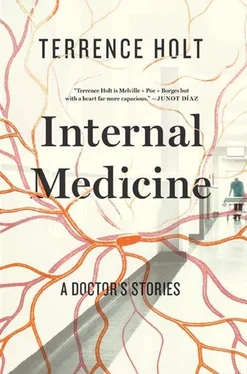The feeling passes, replaced by a kind of nostalgia. He’ll forget me again as soon as I’m gone. I’ll never learn from his account of me what kind of doctor I am. But that’s not it: I am tantalized by the sense that I’ve missed something here. I thought I was giving him bad news. The bad news wasn’t his, but mine.
Out at the nursing station, I pick out of the general hubbub a nurse’s voice speaking my name and the words “over there,” and through the doorway see a man looking my way.
The family resemblance is strong. “I’m Charles Jenkins,” the man says. He looks past me into the room. At my back I hear a sudden cry.
The reunion is a happy one. I leave them there, edging out of the room as I’ve edged out of so many, leaving the family to gather up the plastic bags of personal belongings, medications, paperwork with discharge instructions. My last memory of Thomas Jenkins is of him looking up from the chair, sunlight surrounding him, his face alight in the recognition of one of the few faces in the world he can still remember.
I like to think of him that way. That way, and no other. I only wish I could hold myself so finally aloof from time.
DURING MY FIRST MONTH AS WARD RESIDENT, I was assigned to the oncology service. I hated it. Any service on which patients routinely die during morning rounds upsets me. And there were always too many patients, most of them being treated for some terminal process with drugs that made them sick to just this side of death and not infrequently beyond. Some doctors enjoy this kind of challenge; I’m not one of them. It scared me. I was twenty years older than the rest of the residents in the hospital, and it shook me in some way I wasn’t able even to name. As if some vulnerability within me were waiting to declare itself. Something that, like cancer, I would discover only after it was too late.
Which may have been why, that month at least, I tended to leave the routine business of the service to my competent intern, Mike, and on the weekends didn’t mind looking after my orphan. “Orphan” is the name given to any intern admitting patients when her own resident isn’t around; on weekends when I was admitting, one of my responsibilities was to supervise the orphan also admitting that day.
The current orphan’s name was Virginia; she went by Virgie, and she was assigned to the gastrointestinal, or GI, service. This is another subspecialty the house staff tends to regard with distaste, but compared to oncology it seemed to me a clean, well-lighted place. True, the patients include a fair number of GI bleeders, who require close watching but never quite buy the transfer to, say, a surgical bed that would get them off your census. You usually also have two or three patients in the final stages of liver failure, who are generally delirious, capable of taking sudden nasty turns, and infected with viruses you don’t want to bring home to your family. Add to that the pancreatitis patients (unstable alcoholics who withdraw under your care), the inflammatory bowel patients (unhappy), and the occasional fecal impaction (don’t ask), and you can understand why, when Virgie returned my page that morning, she sounded a little harried.
“Just checking in,” I said. “How’s your day going?”
“It’s horrible,” she cried. “We just finished rounding and I’ve got three discharges to get out and a float down in the ER I haven’t even seen yet.”
As problems go, I thought, this wasn’t bad. Discharges were a good thing. And the patient in the ER was probably stable. But for the sake of form I asked.
“I think so,” Virgie said. “Some bogus abdominal pain thing. But I don’t know when I’m going to see her. Could you go? I’ll get there as soon as I can.”
“Take your time,” I said soothingly. “Happy to help out.”
“Thank you thank you thank you,” she cried, and hung up.
I was happy, I realized as I made my way down the quiet back stairs to the basement. Somebody else’s patient to see. Already worked up. Probably not dying. More of a social visit than anything else.
Ten-thirty on a Saturday morning, and the emergency department was already busy. Most of the bays were occupied, and the noise was enough to make ordinary conversation difficult; there were shouts coming from one of the trauma bays on my right. I ran my eye over the bank of monitors suspended above the front desk, checking the list of patients for anything that looked like it might be coming my way. The one good thing about oncology was that it tended to get its admissions from clinic, and the clinic wasn’t open on weekends. But sicklers, intractable pain, clotting problems of various sorts, and the occasional blast crisis could come in at any time. And once the other services filled up, we would be in line for whatever needed admitting. But the board seemed clear for now, so I looked for the name Virgie had given me. I found her on the first screen, Bay 7: Crawley, A. , her name in pink to indicate her sex. Her time of arrival the night before (10:42) was highlighted in orange, a token of the emergency department’s outrage at her continued presence here. This probably accounted for some of Virginia’s urgency about her pending discharges: she was undoubtedly getting pressure from bed control to free up space for incoming admissions.
I pulled the chart for Bay 7. This is a bed at the front of the ER, where they like to keep the unstable ones. I wasn’t sure what there was about Crawley that merited this. I registered this question, like most questions in the hospital, as a pang, a surge of doubt that distracted me as I thumbed through the untidy stack of papers on the clipboard.
A. Crawley was a float — a patient worked up by the night shift and handed over to an intern the next morning for ongoing care. Floats are notoriously iffy: the system has too many cracks where orders, lab results, sometimes entire patients can get lost; and the workup, conducted by a resident whose internal clock is even more messed up than usual, can vary from merely sketchy to outright delusional. It had been drummed into me early in my training: always eyeball the float.
The admission note told me little. This was a twenty-two-year-old female who had come in with a one-day history of nausea, vomiting, and abdominal pain. No significant medical history, no drug allergies, no sick exposures except to a dog known (how, I could not begin to guess) to harbor parvovirus B19. It was clear this was a red herring included in the history in a display of mere thoroughness: factual, obscure, irrelevant. Ms. Crawley had endured her nausea, vomiting, and abdominal pain for approximately twelve hours, at which point she had attempted to treat it with a few Tylenol Sinus tablets. When those failed to bring relief, she came in to the ED.
As stories went, it sounded odd. Twelve hours of a bellyache don’t usually bring otherwise healthy young people to the hospital. I was left with a familiar mix of annoyance (this was wasting my time), relief (nothing horrible was going to happen), and dread (what was I missing?). According to this script, the lady shouldn’t have come in. But she had. And they’d put her up front in Bay 7 where they could keep an eye on her. Why?
I scanned the rest of the note. The review of systems — that laundry list of symptoms with which we catechize admissions (“Anyfeverschillsnightsweatsweightlosschestpaincoughorchangeinthecolorofyourstools?”) — added nothing to the history. Physical exam ditto: mild abdominal tenderness. Meaningless. The labs and X-rays seemed to rule out any specifically abdominal pathology. But there were two false notes that got my attention. Her white count was slightly elevated, indicating a possible infection. And her serum lactate was high. This was the one that made me stop and look up for a moment.
Читать дальше












